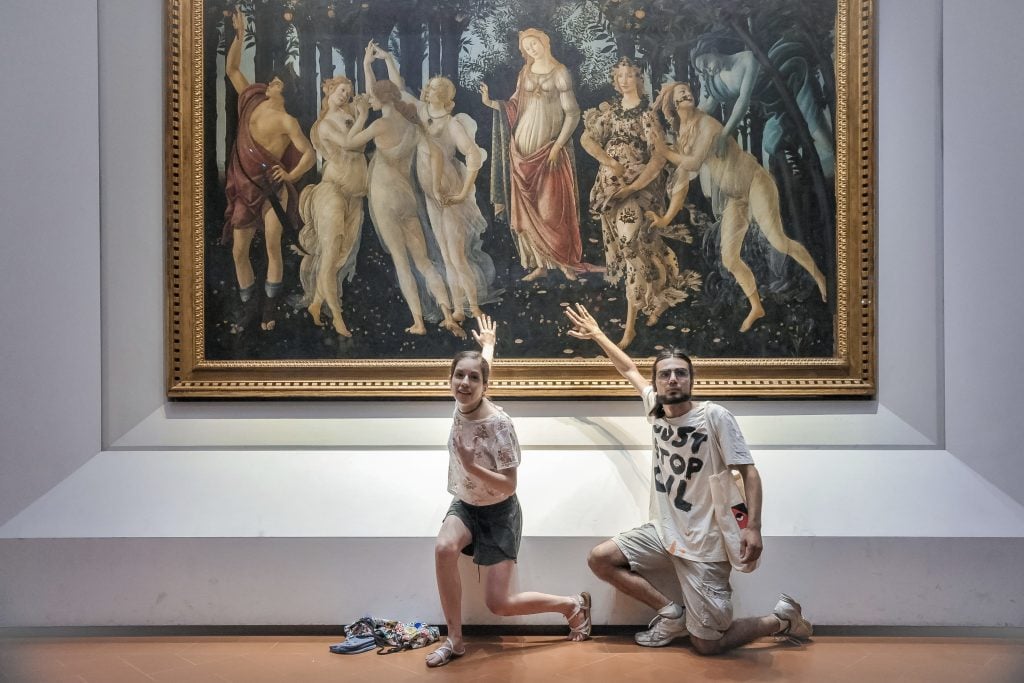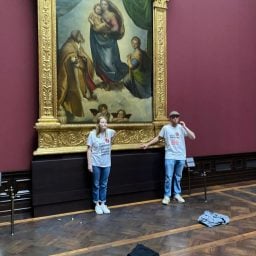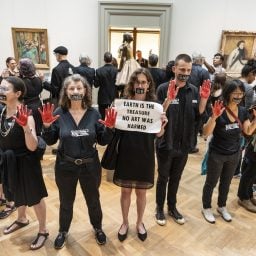News of European climate activists affixing themselves to famous artworks is coming so fast and furious it’s difficult to keep up. This summer, demonstrators have glued their hands to the glass enclosure protecting Sandro Botticelli’s Primavera at the Uffizi in Florence, the frame of Vincent van Gogh’s Peach Trees in Blossom at London’s Courtauld Institute, and the base of the statue Laocoön and His Sons at the Vatican Museums, among many others.
Because demonstrators are not affixing themselves directly to the artworks, experts are divided over whether their actions are putting world heritage at risk.
The German Cultural Council, which oversees the nation’s cultural organization, has criticized the protests. “As much as I can understand the despair of the climate activists, I say clearly that the act of gluing themselves to the frames of famous works of art is clearly wrong. The risk of damaging the artworks is very high,” German Cultural Council managing director Olaf Zimmermann told the Associated Press. “The works put in danger are part of world cultural heritage and deserve to be protected as well as our climate.”
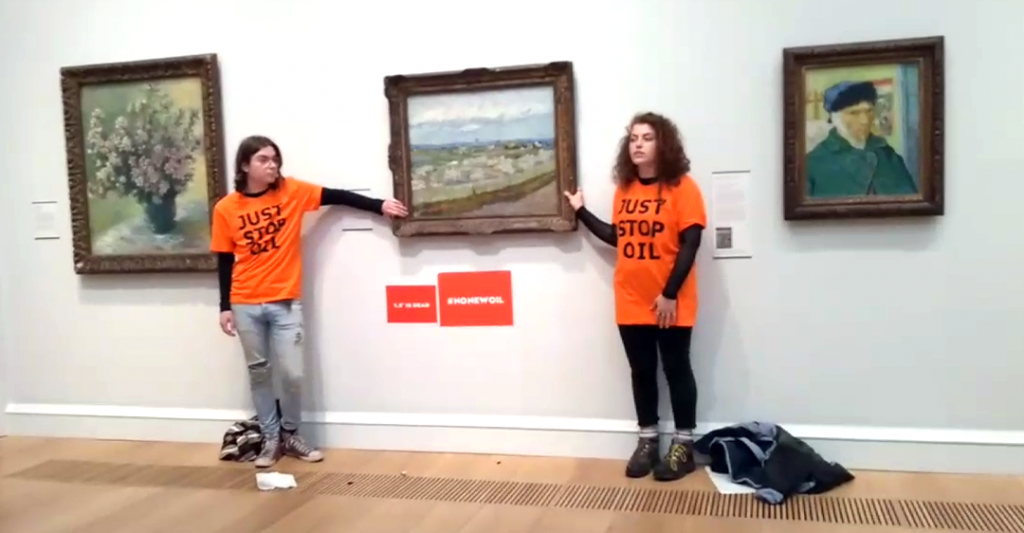
Members of the environmental protest group Just Stop Oil glued to Vincent van Gogh’s Peach Trees in Blossom (1889). Photo courtesy of Just Stop Oil.
A Busy Summer
Since late June, the incidents have come one right after another, starting with Horatio McCulloch’s My Heart’s in the Highlands (1860) at the Kelvingrove Art Gallery and Museum in Glasgow, in a protest by Just Stop Oil. The group also hit the Manchester Art Gallery, and London’s National Gallery, and Royal Academy.
But the American Institute of Conservation is more sympathetic. The climate activists “are looking for ways of amplifying their voices because they’re worried, rightly so, that many governments are not taking climate concerns to heart,” Corina Rogge, the organization’s vice president, told Artnet News. “Because museums preserve our shared humanity, it’s really understandable that activists are using them to try and bring awareness of how climate change is threatening humanity.”
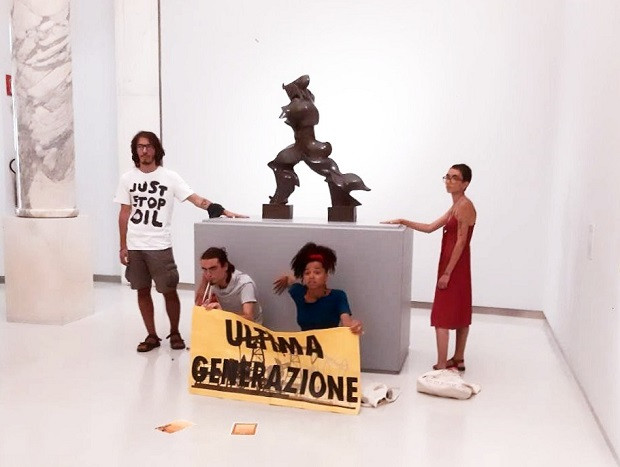
Members of the activist group Ultima Generazione glued to a plinth supporting Boccioni’s 1913 bronze, Unique Forms of Continuity in Space at the Museo del Novecento in Milan on July 30. Photo courtesy of Ultima Generazione.
In Italy, the movement has been led by Ultima Generazione, with actions at the Museo del Novecento in Milan; the Vatican Museums in Rome, where the target was the ancient Roman statue Laocoön and His Sons; and Padua’s Scrovegni Chapel, home to a famed fresco cycle by the proto-Renaissance artist Giotto, where they chained themselves to a railing.
“It’s important for us to value art, instead of damaging it, like our governments do with the only planet,” the group said in a statement, German news outlet DW reported.
Most recently, the trend spread to Germany, where members of a group called Letzte Generation, supporters of Ultima Generazione, glued themselves to Raphael’s Sistine Madonna at the Old Masters Picture Gallery in Dresden. The group later hit a Nicolas Poussin painting at the Staedel Museum in Frankfurt, a Lucas Cranach the Elder work at Berlin’s Gemaeldegalerie, and a Peter Paul Rubens at Munich’s Alte Pinakothek.
“Climate catastrophe is an unprecedented threat of incredible proportions: killer droughts, devastating heat, all-consuming forest fires. These will increase dramatically in the coming years. Not just here in Germany… but worldwide,” Jakob Beyer, a 28-year-old activist who took part in the Dresden action, told the AP.
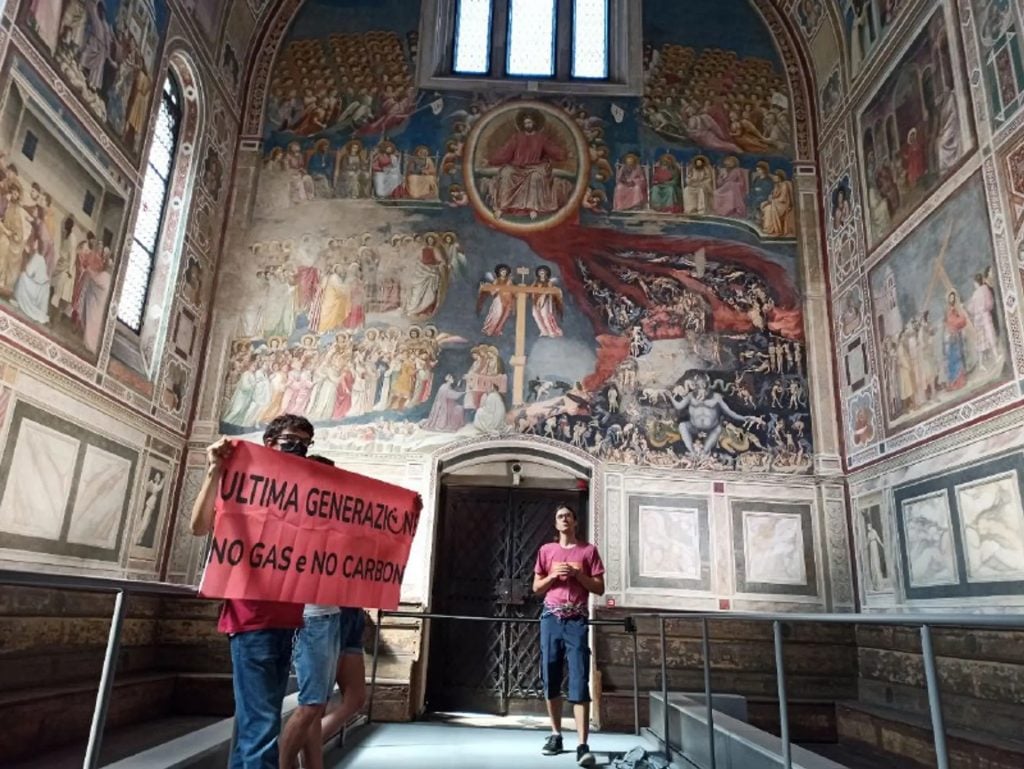
Ultima Generazione protesting at the Scrovegni Chapel in Padua. Photo courtesy of Ultima Generazione.
Levels of Risk
Museums have responded to climate activists by calling security or the police and removing them from the premises.
While their actions may be disruptive, in Rogge’s view, they are still relatively harmless. “Thus far, it seems that most of these individuals have been respectful in their approaches to this,” she said. “You could argue that they’ve violated museums’ trust in visitors in doing this, but the gluing of one’s hand to the frame will impact the frame—it’s not going to impact the painting. Conservators are incredibly highly trained, and will be able to respond appropriately, and treat the work ethically with the care and respect that it deserves.”
A conservation scientist, Rogge lives in Houston, where she works at both the Menil Collection and the Museum of Fine Arts Houston. Both institutions are very aware of the growing risk of severe storms in the region, which was devastated by Hurricane Harvey in 2017.
“My museums are incredibly concerned about climate change and its impact of our collections and the community at large,” Rogge said. “The increasing number of hurricanes and the intensity of storm forces are something we are reckoning with.”
The Institute of Conservation also has a sustainability committee, and makes resources available to organizations who have been impacted by natural disasters, including helping rescue materials that have been damaged by flood, fires, and tornados.
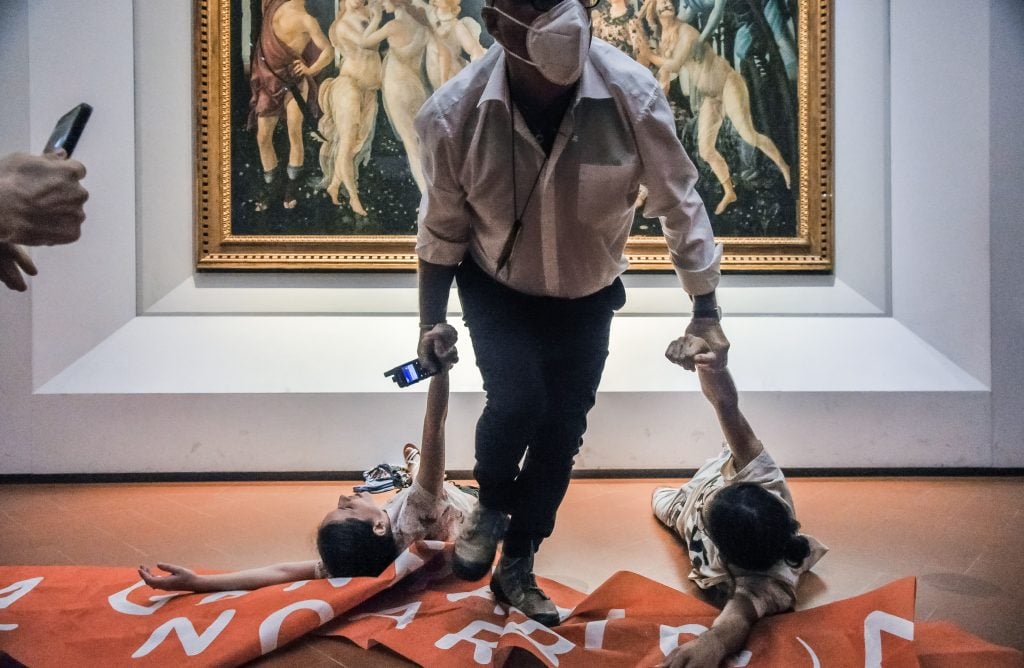
Protesters from the action group Ultima Generazione being dragged out of the Uffizi in Florence, Italy, after gluing their hands to the glass covering Sandro Botticelli’s Primavera. Photo by Laura Lezza/Getty Images.
Compared to such natural threats, climate activists armed with superglue and handcuffs present a minimal risk to museums collections.
“Every time a museum puts an object out on view, we are exposing it to risk. People are people. People trip. They don’t look where they are going. There are small children in galleries,” Rogge said. “Accidents happen.”
“Climate change is the primary thing that museums need to worry about—all it takes is a single forest fire, and you’ve lost an entire collection,” she continued. “Museums can do all the emergency preparedness in the world, but when push comes to shove, an institution may have half an hour, if that, to prepare.”
That being said, the frames that display famous masterpieces are historical objects in their own right, and there are even conservators that specialize in treating them.
“Even if they’re not part of the original artwork, they’re still in the museum and still worthy of care,” Rogge said.
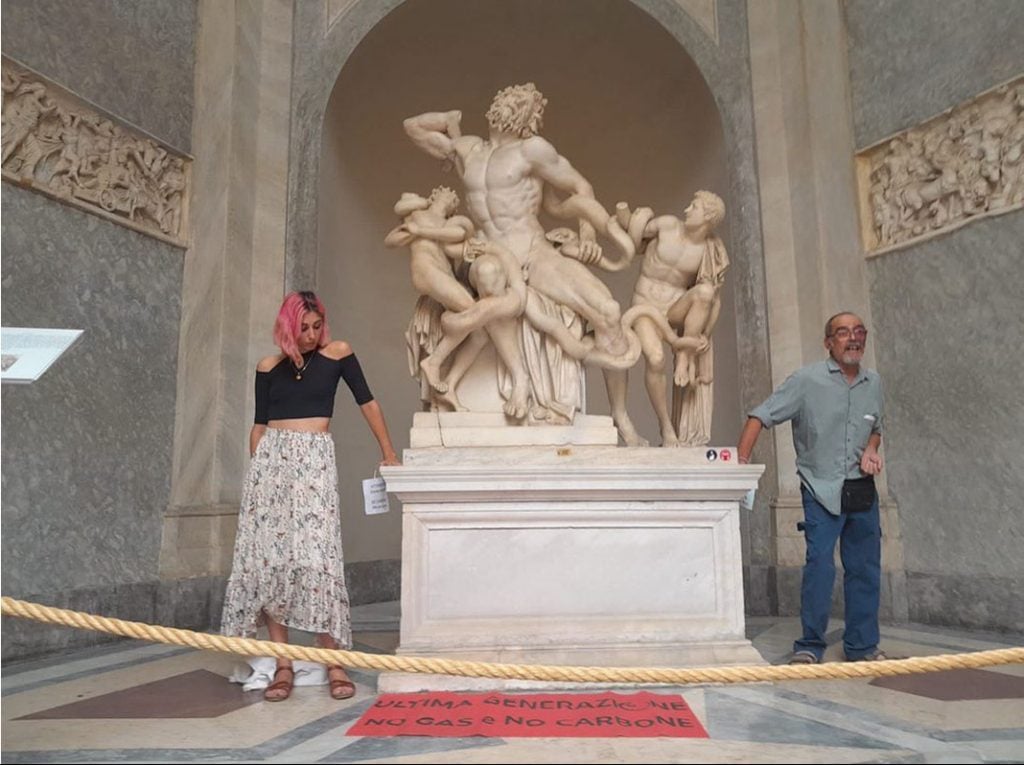
Ultima Generazione activists glued themselves to Laocoön and His Sons at the Vatican Museum in Rome. Photo courtesy of Ultima Generazione.
Activists Face Jail Time
The Courtauld sent the frame for Van Gogh’s Peach Trees out for conservation to remove glue residue, which it said will cost £2,200 ($2,580). Three activists, Emily Brocklebank, Xavier Gonzales-Trimmer, and Louis McKechnie, have been charged in the case. McKechnie is currently being detained at HMP Peterborough prison, with a trial set for November 22, reports the BBC.
“These performative acts can be considered criminal activities, and they can be prosecuted,” Rogge warned. “That’s something that activists need to keep in mind when choosing their actions.”
She encouraged climate activists to reconsider their current approach to museum-based actions.
“Museums can amplify voices of these activists if they give us a chance to work with them. We are cooperative in our need to address the climate change crisis,” Rogge said. “There are different ways to engage with us rather than gluing one’s hand to a frame.”
